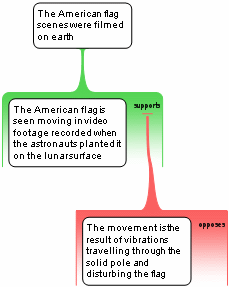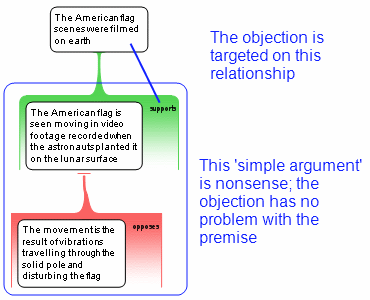
 |
|
|
|
|
| 5.2 Inference Objections | |
Other times, an objection is not aimed at any stated premise; rather, it objects to the connection between the stated premises and the contention. This is an inference objection.
| Discussion |
An inference objection says, roughly, the premises may be true, but the contention doesn't follow; or, put another way, you can't infer the contention from the premises. It provides evidence that the reason is not a good reason for the contention, even if the stated premises are true.
Example:
The American flag is seen moving in video footage recorded when the astronauts planted it on the lunar surface. Given that there is no atmosphere on the Moon, some see this as 'proof' that the scenes were filmed on earth. However the movement is the result of vibrations travelling through the solid pole and disturbing the flag. [Based on 6.1-2]
 |
 |
This is a very important concept, because inference objections are more common than premise objections, and so you have to understand how they work and how to map them.
| New Concepts |
An inference objection is an objection to another simple argument, providing evidence not against any stated premise but against the relationship between the stated premises and their contention.
| Glossary | Contents | |
|
Copyright © Critical Thinking Skills BV - |
|